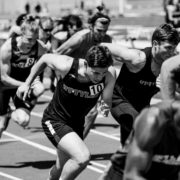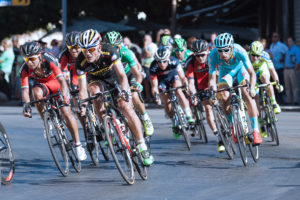Post updated April 12, 2021, to improve clarity.
When we think of eating disorders in athletics, we often point to overbearing coaches in large, competitive sports programs. We bring up an athlete’s desire to please a demanding coach or mention the comments tossed around about restricting food and losing weight.
This often leaves people to think that eating disorders rarely happen in smaller programs, or amongst gentler coaches. And if a coach is not saying anything that would trigger an eating disorder, would an athlete develop it on their own?
Secrecy and Shame
I went to a smaller college. My level of competition equated to NCAA Division II or III.
I had an eating disorder.
My eating disorder thrived when signs were missed by those around me. It thrived when I harbored misconceptions about eating disorders and had no knowledge of its prevalence in sports. My eating disorder rolled its eyes any time my coach would tell the team, “Make sure to replenish with plenty of calories tonight,” because I was restricting my calories and running the fastest. My eating disorder thrived in a mind that thought what she was dealing with “wasn’t bad enough.”
I convinced myself that it was simply the discipline and willpower of a high-performance runner.
No One Talks About This
Athletic programs did not bring up nutrition or eating disorders. We didn’t have a dietitian come in and talk about these issues.
When a coach approached me about my weight a week before my final high school track meet, it was a comment about how much weight I had lost. Not about how sad, tired, and exhausted I looked and behaved.
When a sports physician said she’d follow up with me about my period loss, she never did.

Photo: Peter Draugalis
When I started a raw food diet, was repeatedly injured, depressed, and had drastic weight fluctuations, I was not approached about my mental health.
During my junior year of college, I took the initiative to open up to my team about my own struggle with an eating disorder. And I suggested that we talk about these issues each year as a team. Because the more I talked about it, it seemed more athletes were willing to speak up as well.
When it was finally out in the open, we were better able to see there was a problem and do something about it.
We were talking.
Shame, Fear, and Denial
I say all of this not to blame coaches, but to point out the missing piece in our system. Athletes everywhere–from every program/division–are struggling silently due to a lack of knowledge and openness, and shame, fear, and denial. Coaches are often left in the dark with how to follow up with someone who has an eating disorder. They have little knowledge of what it entails beyond appearance.
There is currently no training required for coaches to learn how to identify eating disorders and to help athletes get the professional help they need sooner. We do, however, have resources. Part of the Running in Silence mission is to spread awareness so that athletic staff knows how important it is to read these resources.
Whether it’s from the pressure of an intense coach, or the inner voice that tells an athlete they need to achieve more through weight loss, eating disorders affect all athletes, at any level of competition.
Coaches can show athletes that to get help and recover is not to give up their sport or run slower, but to find joy in the sport and in their lives. Because the best (and longest) athletic careers often come from having a voice, the power to change for the better, and the people to support them.














